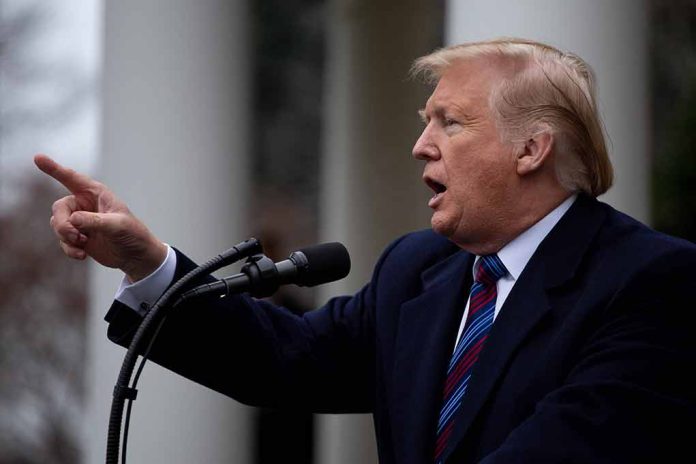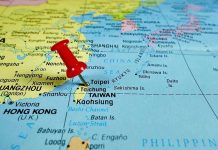
The escalating US-China trade tensions highlight President Trump’s unwavering stance on tariffs, while global markets brace for possible repercussions.
Key Takeaways
- US imposes a 145% duty on Chinese goods, with China retaliating with a 125% duty on US imports.
- President Trump issues a temporary reprieve on tariffs for certain high-tech products while maintaining a firm stance.
- Despite tariffs, the White House remains optimistic about possible trade negotiations with China.
- Global markets are volatile, reacting to the uncertainty of the trade policies.
- China seeks new economic partnerships to offset trade friction with the US.
US Stance: Conditional Tariff Reprieves
President Trump’s administration has taken a stand by temporarily easing tariffs on specific high-tech products. Notably, US officials emphasize that this reprieve does not equate to a permanent exemption for China. Smartphones, laptops, and similar products remain subject to a 20% duty, reflecting a strategic move to address unfair trade practices. Moreover, upcoming plans for tariffs on semiconductors indicate continuing pressure on China. President Donald Trump emphasized in a recent statement that no country is “getting off the hook.”
Global markets have reacted to these uncertain trade policies with notable volatility. Challenges are mounting for businesses and financial markets, which are trying to navigate the complexities of the ongoing US-China trade tensions. Despite the tumult, US stock futures reported slight gains, suggesting an undercurrent of cautious optimism amidst the turbulence.
🔥President Trumps post: Nobody is getting off the hook with Tariffs, especially not China which by far, treats us the worst! 👊🇺🇸 pic.twitter.com/k2FxzJnkxV
— Patriotic 🇺🇸Suzanne⭐️⭐️⭐️ (@suzost) April 13, 2025
China’s Response: Seeking New Economic Partnerships
China’s reaction to US tariffs highlights a quest for economic partnerships aimed at reducing dependency on US trade. Despite welcoming exemptions, China has demanded that the US cancel all tariffs entirely. However, recent exemptions were described by Chinese officials as merely a “small step” in addressing the country’s claims of unfair practices. This response signals China’s determination to grow economically independent amid these challenges.
“We will not be held hostage by other Countries, especially hostile trading Nations like China,” stated President Trump.
The ongoing trade conflict highlights a debate on the broad classification of goods into specific sectors, such as semiconductors—a vital component in global electronic supply chains. Concerns regarding economic stability have also cropped up, with potential investigations into the impact of semiconductors on national security.
Market Implications and Future Trade Prospects
President Trump’s clearer intentions on scrutinizing semiconductors and the electronics supply chain reflect a broader consideration of national security in trade policies. As negotiations waver, US officials project confidence in eventually striking a deal with China, hoping for a productive engagement at negotiating tables. Despite enduring turbulent times, both nations may eventually align on mutually beneficial terms.
Amid the ongoing tensions, leaders and stakeholders are cautiously observing how this crucial bilateral relationship develops. With careful negotiations, there is hope for tangible progress, minimizing economic instabilities and benefiting global markets.
Sources:
- Trump warns China ‘not getting off the hook’ on US tariffs for electronics | Trade War News | Al Jazeera
- Trump tariffs live: El Salvador’s Bukele visits; White House backs policies
- Trump says China, others not getting ‘off the hook’ on US tariffs – Insider Paper







